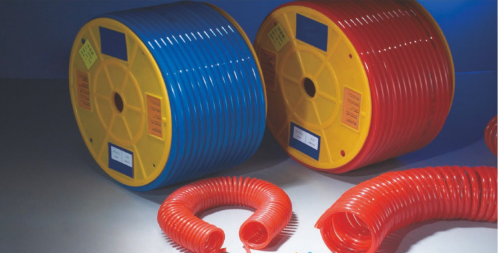Tubing type
Tubing and hose may seem to be the same, but tubes are designated by their external diameter so as to be compatible with push-to-connect fittings. Hose is designated by its internal diameter, and usually comes with rigid, swivel or quick-disconnect fittings that are attached at both ends. Pipes are entirely rigid, constructed from a single solid material and usually defined by their internal diameter dimension.
Tubes are relatively rigid vessels generally made from one solid material, typically some kind of thermoplastic, which can also be internally reinforced for higher strength:
Nylon is light, tough and dimensionally stable, with low water absorption and high resistance to flexural fatigue.
Polyurethane is flexible, strong, resistant to abrasion and kinks and can also withstand contact with oils and fuels.
Polyethylene and high density polyethylene (HDPE) are widely resistant to solvents and chemicals, and relatively cheap with good flexibility.
Polypropylene withstands UV radiation, is resistant to chemical attack and can be formulated for use in food-contact applications.
PVC and CPVC (chlorinated polyvinyl chloride) is light and usually more flexible than polyethylene or nylon, with a good resistance to chemicals, and can sustain repeated sterilisation. It is also usually transparent, enabling visual confirmation of flow.
Hoses are completely flexible vessels constructed from a variety of the same thermoplastic materials. An inner tube is reinforced with one or more layers of spiral-wound or braided fibres, with a protective outer cover. Hose is generally more expensive than tubing but is more rugged and durable, as it is often used for manual tools and gets dragged across abrasive surfaces.
from Internet
Post time: Apr-02-2022


